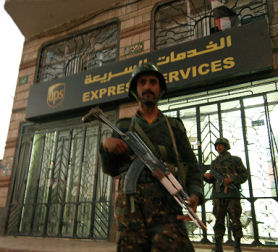Yemen police hold student over cargo plane bombs
Police in Yemen detain a female student and her mother on suspicion of mailing two bombs found on cargo planes in the UK and Dubai. Jonathan Rugman looks at how governments could respond to the plot.

Yemen’s president Ali Abdullah Saleh told reporters that intelligence provided by the US and United Arab Emirates had helped identify the young woman, believed to be in her 20s. A Yemeni security official confirmed that the student’s mother had also been detained.
Officials said she had been traced through a telephone number she had left with a cargo company.
But the search continues for other suspects, and officials indicated that some are believed to have used forged documents and ID cards.
US officials are also hunting the same bomb maker responsible for the failed Detroit bombing last Christmas, Saudi-born Ibrahim Hassan al-Asiri. Saudi Arabia, which provided intelligence that helped identify the parcel bomb threat, put Asiri at the top of its terrorism list in 2009.
Authorities were also looking at two language institutions the plotters may have been associated with.
The two devices, hidden in printer cartridges and containing the powerful explosive pentaerythritol trinitrate (PETN), were found on cargo planes at East Midlands airport and in Dubai on Friday. Both packages were addressed to synagogues in Chicago.
Al-Qaeda in the Arabian Peninsula: who are they?
Last night, Prime Minister David Cameron said the devices were designed to explode while the aircrafts were in mid-air.
Speaking at Chequers ahead of a meeting with German Chancellor Angela Merkel, Mr Cameron said of the device found in the UK: “We believe that the device was designed to go off on the aeroplane. We cannot be sure about the timing when that was mean to take place.
“There is no early evidence it was designed to take place over British soil, but of course we cannot rule that out.”
US Homeland Security Secretary Janet Napolitano said the parcel bombs sent from Yemen had the hallmarks of al-Qaeda, and in particular al-Qaeda’s Yemeni branch, al-Qaeda in the Arabian Peninsula (AQAP). The group, also believed to be behind the Christmas Day bombing attempt, seems to us PETN explosives as their weapon of choice.
AQAP is headed by Nasser al-Wahayshi, a Yemeni former associate of Osama bin Laden. Amongst its members is Anwar al-Awlaki, who has become a key target for security services in both the UK and the US.
Awlaki, who argues al Qaeda’s extremist views using Western ideas and the Internet, has called the Christmas Day bomber one of his “students” and was linked to some of the 9/11 attackers.
Mr Cameron added last night that he had spoken to President Obama, adding: “I have also spoken to President (Ali Abdullah) Saleh of the Yemen making the point that we have to do even more to crack down and cut out the cancer of al Qaida in Yemen and the Arabian Peninsula.
“We have immediately banned packages coming to or through Britain from the Yemen and we will be looking extremely carefully at any further steps we have to take.”
Mr Cameron said the package started in Yemen, landed in Germany and was then transported to Britain en route to America, adding: “It just shows how united and determined we have to be to defeat terrorism.”
Al-Qaeda Coming Home to Yemen
It seems inevitable that the focus of western intelligence agencies will have to widen and shift from the Pakistan-Afghanistan border back to the Arabian Peninsula, where al-Qaeda began.
So how do we help make Yemen safer, beyond banning flights from its territory and strengthening cargo transport security around the world?
Those who know the country well insist that nothing less than a Marshall Plan of economic development, funded by the rich Gulf States and others, will put the country on its feet.
American boots on the ground is not an option. The occupation by "infidel" forces from the holy lands of Mecca and Medina on the Arabian Peninsula was given as the justification for September 11th, and more Americans would only boost al-Qaeda's cause.
The most likely short term scenario is an increase in unmanned drone attacks on suspected al-Qaeda targets. But bear this in mind – the strength of al-Qaeda in Yemen may be no more than 500 to 700 men. Get the strategy wrong, with inaccurate bombing raids and clumsy Yemeni-led offensives, and the al-Qaeda corps could double in numbers in a matter of months. In short, Britain's chief role in Yemen is to ensure that America does not make a bad situation worse.
Read more
Student protests
Other students at Sana’a University in Yemen have staged protests at the arrest of the student in connection with the plot. They also said the woman was in her final year of a computer science degree, rather than a medical degree as officials had stated.
“She was not known to be active in anything, not politics nor religion,” engineering student Yahya al-Hammadi told Reuters. “I am totally perplexed by this.”
Neighbours of the woman told Reuters she and her family were known in the neighbourhood as pious but not as holding extremist views.
“We were shocked because we knew of nothing suspicious about the girl or her family,” said Mohammed Saleh al-Ashwal, who witnessed the raid on the woman’s house on Saturday night.